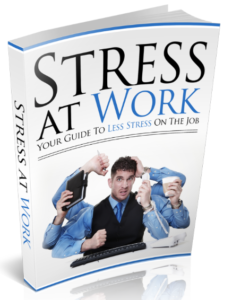Introduction to Work Stress
Work stress is a common issue that many people face. It can affect your mental and physical well-being, as well as your overall productivity. Identifying the signs of work stress at work is crucial in order to take necessary steps to manage it effectively. In this blog post, we will discuss some common signs of stress at work and provide practical strategies to help you deal with it.
Signs of Work Stress
1. Physical Symptoms:
Stress can manifest itself in various physical symptoms such as headaches, muscle tension, fatigue, and sleep disturbances. If you frequently experience these symptoms, it may indicate that you are stressed at work.
2. Emotional Changes:
Feeling irritable, anxious, or overwhelmed are common emotional changes associated with workplace stress. If you notice a significant change in your mood or emotions, it is important to address the underlying cause.
3. Decreased Productivity:
Excessive stress can hamper your ability to concentrate and focus on tasks, leading to a decline in productivity. If you find it increasingly difficult to complete your work efficiently, stress may be a contributing factor.
4. Interpersonal Problems:
Stress at work can also impact your relationships with colleagues and superiors. If you notice an increase in conflicts or difficulty in communicating effectively, it may be a sign of workplace stress.
Effective Ways to Manage Work Stress
 1. Identify the Source:
1. Identify the Source:
Start by identifying the specific factors that are causing stress at work. Is it an overwhelming workload, a toxic work environment, or a lack of work-life balance? Once you identify the source, you can take appropriate steps to address it.
2. Practice Self-Care:
Engaging in self-care activities is essential for managing stress. Prioritize activities that promote relaxation and well-being, such as exercise, meditation, or spending time with loved ones.
3. Set Boundaries:
Establish clear boundaries between work and personal life. Avoid checking emails or engaging in work-related activities during your personal time. This will help create a healthier work-life balance.
4. Seek Support:
Don’t hesitate to seek support from your colleagues, friends, or family members. Talking about your stress can provide a fresh perspective and valuable advice on how to cope with it.
5. Time Management:
Effective time management can significantly reduce work-related stress. Prioritize your tasks, set realistic deadlines, and delegate when necessary. This will help you stay organized and prevent feelings of overwhelm.
Conclusion
Recognising the signs of stress at work is the first step towards managing it effectively. By implementing the strategies discussed in this blog post, you can create a healthier and more balanced work environment. Remember, your well-being should always be a priority, and taking proactive steps to manage stress is essential for your overall happiness and success.
If you would like some more information, you can download this free PDF eBook which covers this subject in more detail from our friends at freebiesave.org. Don’t worry, it will not ask for any details, just click on the book image or this link here:
Scroll down the page to find the book and click on the download button and why not browse the other great freebies on the site.









